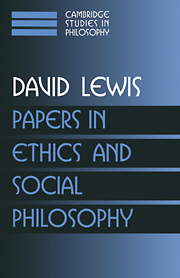Book contents
- Frontmatter
- Contents
- Introduction
- 1 Semantic analyses for dyadic deontic logic
- 2 A problem about permission
- 3 Reply to McMichael
- 4 Why ain'cha rich?
- 5 Desire as belief
- 6 Desire as belief II
- 7 Dispositional theories of value
- 8 The trap's dilemma
- 9 Evil for freedom's sake?
- 10 Do we believe in penal substitution?
- 11 Convention: Reply to Jamieson
- 12 Meaning without use: Reply to Hawthorne
- 13 Illusory innocence?
- 14 Mill and Milquetoast
- 15 Academic appointments: Why ignore the advantage of being right?
- 16 Devil's bargains and the real world
- 17 Buy like a MADman, use like a NUT
- 18 The punishment that leaves something to chance
- 19 Scriven on human unpredictability (with Jane S. Richardson)
- Index
15 - Academic appointments: Why ignore the advantage of being right?
Published online by Cambridge University Press: 24 December 2009
- Frontmatter
- Contents
- Introduction
- 1 Semantic analyses for dyadic deontic logic
- 2 A problem about permission
- 3 Reply to McMichael
- 4 Why ain'cha rich?
- 5 Desire as belief
- 6 Desire as belief II
- 7 Dispositional theories of value
- 8 The trap's dilemma
- 9 Evil for freedom's sake?
- 10 Do we believe in penal substitution?
- 11 Convention: Reply to Jamieson
- 12 Meaning without use: Reply to Hawthorne
- 13 Illusory innocence?
- 14 Mill and Milquetoast
- 15 Academic appointments: Why ignore the advantage of being right?
- 16 Devil's bargains and the real world
- 17 Buy like a MADman, use like a NUT
- 18 The punishment that leaves something to chance
- 19 Scriven on human unpredictability (with Jane S. Richardson)
- Index
Summary
Universities exist for the sake of the advancement of knowledge: its transmission by teaching, its expansion by research. Most of those who make academic decisions on behalf of universities will take the advancement of knowledge as their predominant, ultimate aim.
Of course, some people in universities have different aims in mind. They may think the advancement of knowledge is meaningless, or square, or worthless, or unattainable, or just outweighed by some more urgent aim – the cultivation of entertaining new ideas regardless of truth, perhaps, or the civilizing of the future rulers, or the recruiting of a mighty army to smash the state. But let us imagine an especially lucky university, where nearly everyone pursues the ultimate aim of advancing knowledge and where the few dissenters pursue aims so diverse as to cancel one another out.
As a philosopher, I shall tell a story about the philosophy department of this lucky university. But the story applies more broadly. Not perhaps to the department of frenchified literary theory, where skepticism runs rampant and the pursuit of truth is reckoned passé. Not perhaps to the mathematics department, where they are in confident agreement about what's true and how to tell, and they disagree only about what's fruitful and interesting. But in most departments, as in philosophy, (1) the advancement of knowledge is the agreed aim; but (2) there are prolonged disputes over what's true. Wherever both conditions are met, whether it's a matter of the extinction of dinosaurs or of superstrings or of legal realism, my story may be told.
- Type
- Chapter
- Information
- Papers in Ethics and Social Philosophy , pp. 187 - 200Publisher: Cambridge University PressPrint publication year: 1999
- 2
- Cited by



